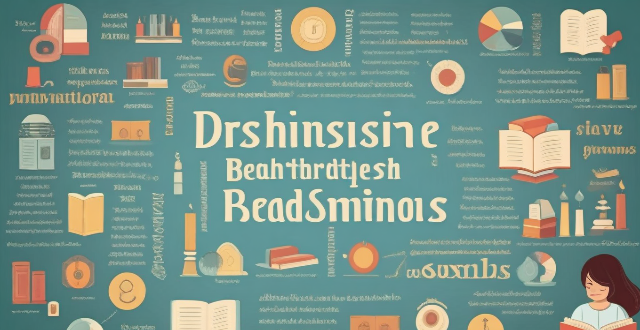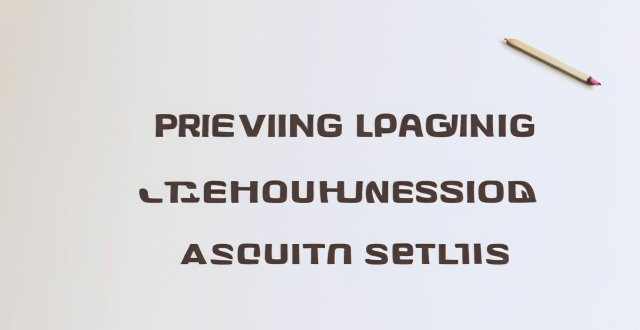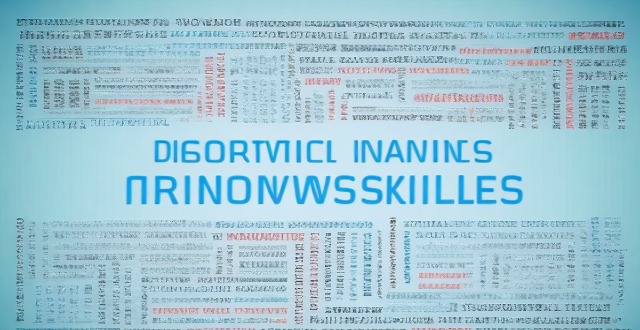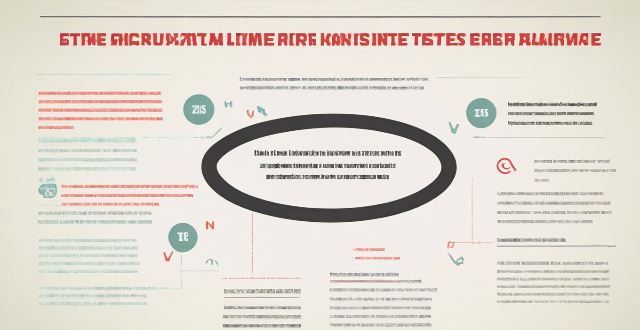Critical Comprehension

How does reading comprehension relate to critical thinking skills ?
The text discusses the relationship between reading comprehension and critical thinking skills, stating that they are closely intertwined. It explains that good reading comprehension skills enable individuals to understand and interpret written text, which in turn supports critical thinking by enhancing vocabulary, promoting inference and interpretation, encouraging evaluative thinking, and fostering open-mindedness. The text concludes that improving reading comprehension abilities strengthens critical thinking skills, enabling individuals to navigate complex challenges with greater insight and effectiveness.

Is there a link between improved comprehension and critical thinking abilities ?
The link between improved comprehension and critical thinking abilities is explored, with a focus on how these skills are interconnected and work together to enhance cognitive abilities. The article suggests that improving one skill can lead to improvements in the other, creating a virtuous cycle of cognitive development. Techniques for improving both skills are also discussed, including reading widely, engaging in debates, and practicing active listening.

What are the best ways to assess reading comprehension levels ?
Assessing reading comprehension levels is crucial in identifying strengths, weaknesses, and areas for improvement. Various methods include oral reading assessment, retelling or paraphrasing, written response questions, multiple-choice questions, and cloze tests. These techniques evaluate fluency, accuracy, understanding of main idea, details, and structure, factual recall, higher-level thinking skills, quick decision-making, context clue usage, grammar rules, vocabulary knowledge, and overall reading comprehension skills. By using a variety of assessment methods, educators can gain a comprehensive understanding of students' reading abilities and tailor instruction accordingly.

How do I teach reading comprehension to young children ?
Teaching reading comprehension to young children is essential for their educational development. Here are strategies for making this process engaging and effective: 1. Start with short, simple texts like picture books, nursery rhymes, or short stories that are age-appropriate and interesting. 2. Make reading interactive by asking questions before, during, and after reading to encourage critical thinking. 3. Encourage vocabulary building by highlighting unfamiliar words and discussing their meanings. 4. Incorporate writing activities such as story maps, character sketches, and sequencing to reinforce comprehension skills. 5. Make learning fun by using games, drama, and music related to the text. Adapt your approach based on the child's interests and abilities to ensure maximum engagement and success.

How does speed reading affect comprehension ?
Speed reading is a technique used to read text faster while maintaining or improving comprehension. However, the impact of speed reading on comprehension can vary depending on several factors such as the individual's reading skills, the difficulty level of the material, and the method used for speed reading. In this article, we will explore how speed reading affects comprehension and provide some tips to improve both speed and understanding.

How can I improve my reading comprehension in a foreign language ?
Improving Reading Comprehension in a Foreign Language Reading comprehension is crucial for learning a foreign language. Here are some tips to enhance your skills: 1. Start with Short Texts: Begin with news articles, blog posts, or children's books to understand simple language and clear structure. 2. Use Dictionaries and Translation Tools: Look up unknown words and phrases, but don’t rely too heavily on them. 3. Practice Active Reading: Engage with the text by asking questions, making connections, and summarizing key points. 4. Read Aloud and Listen to Audiobooks: Improve pronunciation, fluency, and comprehension while enjoying stories. 5. Join a Book Club or Language Exchange Group: Discuss the text, ask questions, and receive feedback from native speakers or other learners. Consistent practice of these strategies will help improve your reading comprehension in a foreign language.

What are some tips for improving reading comprehension skills ?
The text provides tips for improving reading comprehension skills, which include active reading strategies like previewing the text, annotating and taking notes, asking questions, and summarizing. It also emphasizes the importance of building vocabulary through looking up unfamiliar words, using flashcards, and reading widely. Practice is highlighted as a crucial factor in improving comprehension, with suggestions to read regularly, challenge oneself, and join a book club. Understanding the context is another key aspect, achieved by paying attention to details, researching background information, and considering the author's purpose. Consistent practice is emphasized as essential for progress.

How can parents encourage creativity and critical thinking in their homeschooled children ?
To encourage creativity and critical thinking in homeschooled children, parents should create a stimulating learning environment by encouraging open-ended questions and providing varied resources. Engaging in creative activities like art and music can enhance visual-spatial skills and emotional expression. Promoting critical thinking through problem-solving tasks and family discussions can develop analytical skills. Fostering independent learning through project-based and inquiry-based learning encourages self-directed learning. Parents should also encourage questioning and curiosity, integrating technology into learning, promoting reading, and encouraging risk-taking and accepting failure to prepare their children for future challenges and successes.

How can technology be used to enhance reading comprehension ?
Technology has revolutionized the way we learn and acquire knowledge. It has also transformed the way we read and comprehend written materials. In this article, we will explore how technology can be used to enhance reading comprehension. Interactive textbooks are digital versions of traditional textbooks that allow students to interact with the content in a more engaging way. They include multimedia elements such as videos, animations, and interactive quizzes that help students understand complex concepts better. Interactive textbooks also provide immediate feedback, allowing students to identify their strengths and weaknesses and adjust their learning accordingly. Audiobooks and e-readers are becoming increasingly popular among readers of all ages. They offer several advantages over traditional paper books, including portability, accessibility, and customization options. Audiobooks are particularly useful for improving listening skills and building vocabulary, while e-readers allow users to highlight important passages, take notes, and look up unfamiliar words easily. Online learning platforms such as Coursera, Khan Academy, and Udemy offer a wide range of courses on various subjects, including reading comprehension. These platforms provide interactive lessons, practice exercises, and assessments that help students develop their reading skills at their own pace. They also offer social learning opportunities through discussion forums and peer reviews. Gamification is the use of game design elements in non-game contexts to enhance user engagement and motivation. In the context of reading comprehension, gamification can involve turning reading assignments into games or challenges that require students to apply what they have learned in a fun and rewarding way. For example, a teacher might create a treasure hunt where students must find hidden clues within a text or solve puzzles based on the content they have read. Personalized learning involves tailoring instruction to meet the individual needs and preferences of each student. Technology can facilitate personalized learning by providing customized recommendations based on students' performance data and learning styles. For example, an adaptive learning system might recommend additional resources or activities for students who struggle with certain concepts or skills.

Can regular practice with comprehension quizzes help in improving understanding ?
Regular practice with comprehension quizzes can improve understanding by enhancing reading skills, critical thinking, vocabulary, concentration, and confidence.

What role does vocabulary play in reading comprehension ?
The article discusses the crucial role of vocabulary in reading comprehension. It highlights how a robust vocabulary enhances understanding, improves fluency, promotes critical thinking, and increases empathy. The article also provides tips for improving vocabulary, such as reading widely, using flashcards or apps, looking up unfamiliar words, and practicing using new words. By following these tips, readers can expand their vocabulary and become more effective in comprehending texts.

What is critical thinking training ?
This article provides an in-depth analysis of critical thinking training, explaining what it is and why it's important. It lists several benefits of critical thinking, such as enhanced problem-solving skills, improved decision making, boosted communication abilities, and increased adaptability. The article also offers strategies for developing critical thinking skills, such as asking questions, challenging assumptions, considering multiple perspectives, evaluating evidence, avoiding bias, practicing reflective thinking, learning from mistakes, engaging in dialogue, reading widely, and seeking feedback. Overall, the article emphasizes the importance of critical thinking training for personal and professional development.

What are the benefits of having strong reading comprehension abilities ?
Strong reading comprehension abilities can provide numerous benefits such as improved communication skills, enhanced learning capabilities, better problem-solving abilities, and increased employment opportunities.

Can critical thinking training be applied to all aspects of life ?
This text discusses the importance of critical thinking and its applications in various aspects of life, including personal, professional, educational, and social settings. It emphasizes that critical thinking is a universally applicable skill that enhances decision-making abilities and promotes effective communication, creativity, and innovation. By incorporating critical thinking training into daily activities, individuals can improve their overall quality of life and contribute more effectively to society.

How can I improve my critical thinking skills ?
Critical thinking is the ability to analyze and evaluate information or arguments in a clear, rational, and objective manner. Here are some tips on how to improve your critical thinking skills: 1. **Question Assumptions**: Challenge your own beliefs, be open-minded, and avoid jumping to conclusions. 2. **Identify Biases**: Recognize personal biases, look for patterns, and seek out diverse perspectives. 3. **Evaluate Evidence**: Assess credibility, consider context, and weigh pros and cons. 4. **Consider Alternative Viewpoints**: Brainstorm possibilities, explore counterarguments, and stay curious. Improving your critical thinking skills takes practice and patience, but it can lead to better decision-making, problem-solving, and communication skills.

What are some common methods used in critical thinking training ?
The text introduces critical thinking training and presents four methods for improving critical thinking skills: the Socratic method, deductive reasoning, inductive reasoning, and reflective thinking. Each method is explained through an example that demonstrates how it can be applied in practice to foster critical thinking abilities.

How do academic competitions help students develop critical thinking skills ?
Academic competitions play a crucial role in fostering critical thinking skills among students by encouraging problem-solving approaches, stimulating creative and analytical thinking, providing opportunities for collaboration and communication, instilling discipline and dedication, and exposing students to diverse perspectives and ideas. These contests challenge students to apply their knowledge creatively, analyze deeply, collaborate effectively, and communicate clearly, preparing them for real-world problem-solving scenarios.

How can critical thinking training be incorporated into education ?
Incorporating Critical Thinking Training into Education: - Defined as the ability to analyze and evaluate information, critical thinking is crucial for effective decision-making. - Integrating it into education enhances students' learning experiences and readies them for personal and professional growth. - Strategies include curriculum design that integrates critical thinking across subjects and uses real-world applications; teaching methods such as the Socratic Method and inquiry-based learning; assessments that measure these skills; and professional development for educators. - By prioritizing critical thinking in education, students become better equipped for academic success and future careers, developing into engaged, curious, and adaptable learners.

What role does critical thinking play in building a knowledge framework ?
This text discusses the importance of critical thinking skills in building a knowledge framework. It outlines four key aspects of critical thinking: identifying assumptions, evaluating evidence, analyzing arguments, and making informed decisions. By applying these skills, individuals can develop a nuanced understanding of complex issues and make well-reasoned decisions based on sound reasoning and evidence. The article emphasizes the crucial role of critical thinking in personal growth and success in various domains.

How does background knowledge impact reading comprehension ?
Background knowledge significantly impacts reading comprehension by aiding in schema creation, vocabulary recognition, contextual understanding, inferencing, and increasing engagement with the material.

How long does it take to see results from critical thinking training ?
The time it takes to see results from critical thinking training depends on factors such as individual differences, quality of training, frequency and intensity of practice, and feedback mechanisms. Short-term outcomes can be seen within 1-3 months, mid-term outcomes within 3-6 months, and long-term outcomes after 6 months or more. Consistent effort and practice are key to achieving lasting improvements in critical thinking abilities.

Can speed reading help me save time when studying for exams ?
Speed reading can save time when studying for exams by increasing efficiency, improving recall, managing time better, and reducing stress. However, it may compromise comprehension, not be suitable for all text types, require skill development time, and lead to overconfidence. To effectively use speed reading, start early, combine techniques, take breaks, test comprehension, and customize your approach.

How can I improve my comprehension skills in English ?
Improving English comprehension skills is crucial for effective communication. Here are some tips to enhance these abilities: 1. **Read Regularly**: Start with simpler texts and gradually move on to more complex ones, paying attention to new vocabulary, idioms, and sentence structures. 2. **Listen Actively**: Listen to English audio content like podcasts, music, radio shows, and audiobooks to expose yourself to different accents and speaking styles. 3. **Watch English Videos**: Watch movies, TV shows, and educational videos in English, focusing on non-verbal cues and discussing the content with others. 4. **Practice with Language Exchange Partners**: Converse regularly with native speakers, ask questions, and learn from mistakes. 5. **Use Online Resources**: Utilize language learning apps, websites, and forums for interactive exercises, engaging with online communities, and getting personalized feedback.

How can I improve my reading comprehension skills ?
Improving reading comprehension skills requires a consistent effort and the use of various strategies. Here are some key points to help you enhance your ability to understand written texts: 1. Read Regularly - Establish a routine, varying genres and authors. 2. Active Reading - Annotate by highlighting or making notes. - Ask questions before and during reading. 3. Summarize and Paraphrase - Write summaries of sections in your own words. - Create mental images like diagrams or stories. 4. Discuss and Apply - Join book clubs or study groups for discussions. - Apply what you read to real-life situations. 5. Utilize Tools and Resources - Use dictionaries, thesauruses, and research background information. - Access online courses and interactive tools. By integrating these strategies into your daily routine, you can improve your reading comprehension skills over time.

What are the challenges faced by students with poor reading comprehension skills ?
Students with poor reading comprehension skills face numerous challenges in various aspects of their lives, including academic difficulties, lower academic achievement, social and emotional issues, limited career opportunities, and lifelong learning obstacles. These challenges can significantly impact their overall well-being and future prospects, making it crucial for educators, parents, and policymakers to address this issue proactively.

Are there any apps or tools that can help me track my progress in understanding different texts ?
The text discusses various apps and tools that can help users track their progress in understanding different texts, including Reading Comprehension Apps like Quizlet and Khan Academy; Productivity Tools for Text Comprehension such as Evernote and Trello; Online Tools for Text Analysis like SparkNotes and CliffsNotes; and Personalized Learning Platforms like Adaptive Learning Systems. These resources provide features such as flashcards, video tutorials, annotations, note-taking, project boards, database views, plot summaries, character analysis, chapter-by-chapter breakdowns, close reading, personalized pathways, real-time feedback, and reading logs to aid comprehension and monitor progress.

What role do summaries play in improving comprehension of lengthy articles ?
Summaries are crucial for improving comprehension of lengthy articles. They save time, enhance learning, and provide a structured framework for understanding complex information. To use summaries effectively, readers should read the summary first, take notes, and refer back to it after reading the full article. This helps in retaining information and identifying any gaps in knowledge or areas that require further research.

How does one's vocabulary impact their ability to understand complex texts ?
The article discusses the crucial role of vocabulary in understanding complex texts. It emphasizes that a strong vocabulary enhances word recognition, contextual understanding, and inferencing abilities, which lead to improved reading speed, greater comprehension, and enhanced critical thinking skills. The article also provides strategies for building vocabulary, such as reading widely, using flashcards or apps, and practicing with new words.

Can speed reading be applied to all types of texts, including technical and academic materials ?
Speed reading can be applied to all types of texts, including technical and academic materials, but it is important to consider the challenges associated with these types of texts. While speed reading offers time-saving and comprehension improvement advantages, technical and academic materials often contain complex terminology and concepts that require careful consideration and analysis. To effectively apply speed reading to these materials, individuals can employ pre-reading strategies such as previewing and setting objectives, during reading strategies like skimming and scanning, and post-reading strategies including reviewing and summarizing. By using these strategies, readers can maximize the benefits of speed reading while still achieving a deep level of comprehension.

Why is critical thinking training important ?
In today's complex world, critical thinking training is essential for effective problem-solving, communication, objectivity, creativity, and future preparedness. It enhances decision-making, collaboration, fairness, open-mindedness, and adaptability to changes. Investing in this training leads to success and positive impacts in various domains.